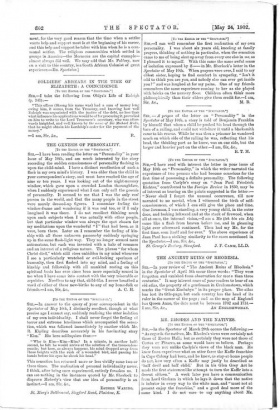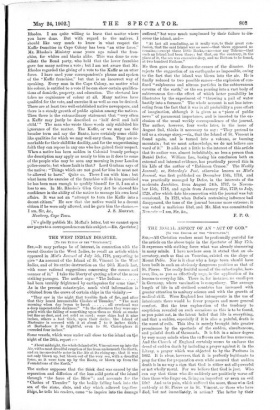KR. RHODES AND THE NATIVES.
[TO THE EDITOR OP THE "SPECTATOR."] .
SIR,—In the Spectator of . March 29th occurs the following :— " As regards the natives, Mr. Rhodes's views were certainly not those of Exeter Hall; but as certainly they were not those of Cortes or Pizarro, as some would have us believe. Perhaps they were not unlike Carlyle's views of the black man. He knew from experience what an utter farce the Kaffir franchise in Cape Colony had been, and he knew, as stay-at-home people do not, how very often a Kaffir may justly be described as 'half devil and half child.' But in his Glen Grey Act he made the first statesmanlike attempt to turn the Kaffir into a decent citizen." A week later you have a communication I. from Lord Graham in which he lays it down that the native is inferior in every way to the white man, and "must not at present enjoy the franchise," and a good deal more of the same kind. I do not care- to say anything about Mr.
Rhodes. I am quite willing to leave that matter where you have done. But with regard to the natives, I should like very much to know in what respect the Kaffir franchise in Cape Colony has been "an utter farce." Mr. Rhodes's Ministry some years ago raised the fran- chise, for whites and blacks alike. This was done to con- ciliate the Bond party, who held that the lower franchise gave too many natives a vote ; but I am not aware that Mr. Rhodes regarded the giving of a vote to the Kaffir as an utter farce. I have used your correspondent's phrase and spoken of the "Kaffir franchise," but that is an incorrect way of speaking. Every man in the Cape Colony, no matter what his colour, is entitled to a vote if he can show certain qualifica- tions of domicile, property, and education. The electoral law takes no cognisance of colour at all. Many natives have qualified for the vote, and exercise it as well as can be desired. There are at least two well-established native newspapers, and there is a steady growth of public opinion among the natives. Then there is the extraordinary statement that "very often a Kaffir may justly be described as half devil and half child.' " The man who wrote those words only exhibited his ignorance of the matter. The Kaffir, or we may use the broader term and say the Bantu, have certainly some child- like qualities for which we may well envy them. They are re- markable for their childlike docility, and for the unquestioning faith they can repose in any one who has gained their respect. When a native has been sodden in Colonial brandy perhaps the description may apply as nearly to him as it does to some of the people who may be seen any morning in your London police-courts ; but whose fault is that ? Lord Graham says of the native: "Things which are not good for him he must not be allowed to have." Quite so. There I am with him ; but what harm the exercise of the franchise will do him provided he has been man enough to qualify himself for it., I am at a loss to see. In Mr. Rhodes's Glen Grey Act he showed his confidence in the ability of the native to manage his own local affairs. It was not an "attempt to turn the Kaffir into a decent citizen." He saw that the native would be a decent citizen if he were only allowed, and he gave him the chance.—
[We gladly publish Mr. Moffa,t's letter, but we cannot open our pages to a correspondence on this subject.—En. Spectator.]







































 Previous page
Previous page